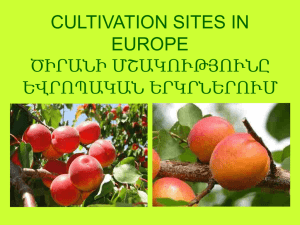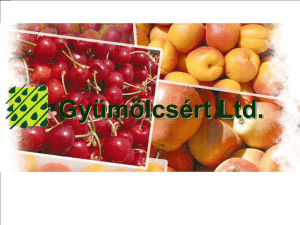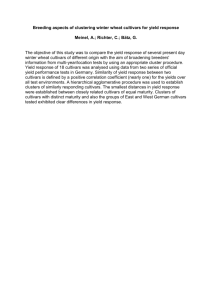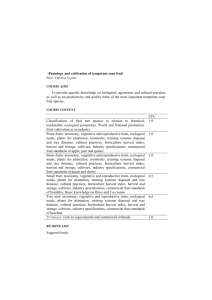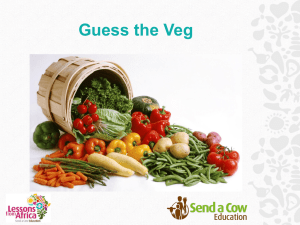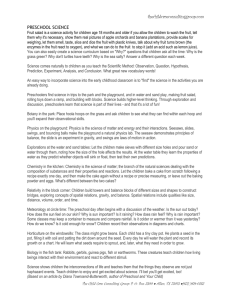Physical and Thermal Properties of Flax Seed
advertisement
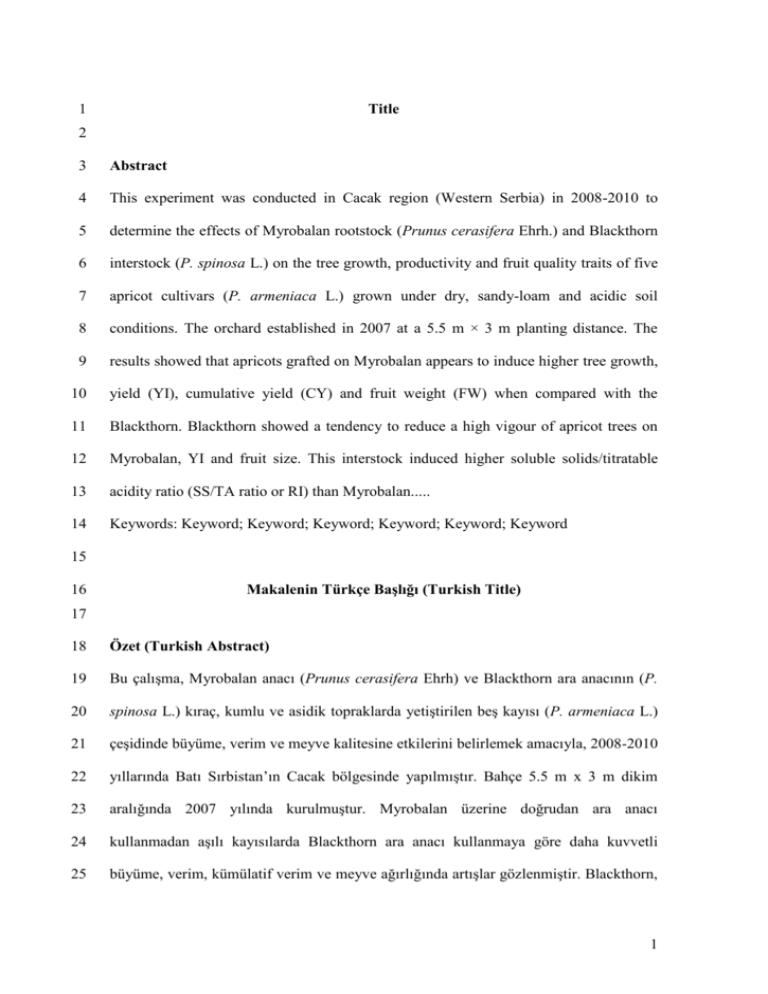
1 Title 2 3 Abstract 4 This experiment was conducted in Cacak region (Western Serbia) in 2008-2010 to 5 determine the effects of Myrobalan rootstock (Prunus cerasifera Ehrh.) and Blackthorn 6 interstock (P. spinosa L.) on the tree growth, productivity and fruit quality traits of five 7 apricot cultivars (P. armeniaca L.) grown under dry, sandy-loam and acidic soil 8 conditions. The orchard established in 2007 at a 5.5 m × 3 m planting distance. The 9 results showed that apricots grafted on Myrobalan appears to induce higher tree growth, 10 yield (YI), cumulative yield (CY) and fruit weight (FW) when compared with the 11 Blackthorn. Blackthorn showed a tendency to reduce a high vigour of apricot trees on 12 Myrobalan, YI and fruit size. This interstock induced higher soluble solids/titratable 13 acidity ratio (SS/TA ratio or RI) than Myrobalan..... 14 Keywords: Keyword; Keyword; Keyword; Keyword; Keyword; Keyword 15 16 Makalenin Türkçe Başlığı (Turkish Title) 17 18 Özet (Turkish Abstract) 19 Bu çalışma, Myrobalan anacı (Prunus cerasifera Ehrh) ve Blackthorn ara anacının (P. 20 spinosa L.) kıraç, kumlu ve asidik topraklarda yetiştirilen beş kayısı (P. armeniaca L.) 21 çeşidinde büyüme, verim ve meyve kalitesine etkilerini belirlemek amacıyla, 2008-2010 22 yıllarında Batı Sırbistan’ın Cacak bölgesinde yapılmıştır. Bahçe 5.5 m x 3 m dikim 23 aralığında 2007 yılında kurulmuştur. Myrobalan üzerine doğrudan ara anacı 24 kullanmadan aşılı kayısılarda Blackthorn ara anacı kullanmaya göre daha kuvvetli 25 büyüme, verim, kümülatif verim ve meyve ağırlığında artışlar gözlenmiştir. Blackthorn, 1 26 ara anacının kayısı ağaçlarının doğrudan Myrobalan’a aşılamaya göre verim ve meyve 27 boyutunda azaltma eğilimi gösterdiği belirlenmiştir. Bu ara anaç, Myrobalan’dan daha 28 yüksek bir suda çözünebilir katı madde miktarı/titre edilebilir asitlik oranı beraberinde 29 getirmiştir. Bu sonuçlara göre Myrobalan anacının doğrudan kullanılması, Blackthorn 30 ara anacı kullanılması durumunda ağaçların kuru, killi kumlu ve asidik topraklara daha 31 iyi adaptasyon göstermiştir.... 32 Anahtar Kelimeler: Anahtar kelime; Anahtar kelime; Anahtar kelime; Anahtar kelime; 33 Anahtar kelime; Anahtar kelime 34 1. Introduction 35 The apricot (P. armeniaca L.) fruit is highly appreciated by consumers and is one of the 36 most important fruit species grown in the world. The greatest amount of the world’s 37 apricot production comes from the countries around the Mediterranean Sea, that is, 38 Turkey (Güner & Gezer 2001) Spain, Italy, France, and Greece (Drogoudi et al 2008). 39 Serbia has a great potential to produce many different kinds of fruits as a result of the 40 wide variety of soil and environmental conditions. Apricot is one of them by 27 to 41 41 thousand tons yearly production (FAOSTAT 2011).... 42 43 The most important apricot growing area in Serbia is the Region of Cacak located in 44 Western Serbia. However, the major factors limiting the intensive spread of apricot in 45 Serbia include: blossoms killed by spring frosts, sudden (premature) wilting - Apoplexy, 46 winter killing of flower buds prior to bloom, Plum pox virus infection in apricot trees 47 and the absence of quality rootstock (Milošević et al 2010).... 48 2. Material and Methods 49 2.1. Plant material and field trial 2 50 The trial was conducted at an experimental orchard located in Prislonica near Cacak, 51 Western Serbia (43°53’N latitude; 20°21’E longitude; 340 m altitude). The trees, spaced 52 at 5.5 m × 3 m, were planted in 2007; training system was open vase. This training 53 system controlled tree vigor by pruning in the summer. The orchard was managed 54 following the usual standard procedures under non-irrigated practices. The experiment 55 was established in a randomized block design with five trees for each stock-scion and 56 stockinterstock-scion combination in four replicates. Tree growth, YI, YE and fruit 57 quality traits were evaluated over three consecutive years (2008-2010), i.e. from second 58 to fourth year after planting.... 59 2.2. Soil and weather conditions 60 Soil in the trial was dry, shallow and acidic, with 1.68% organic matter, 0.16% NTOT, 61 178 mg kg-1 P2O5, 220 mg kg-1 K2O, 0.39% CaO, 6.2 mg kg-1 MgO, and a sandy- 62 loam texture. The soil pH in 0.01M KCl was in the range from 4.86 (0-30 cm) to 4.33 63 (31-60 cm soil depth). In general, soil conditions were poor for normal vegetative and 64 reproductive growth of apricot trees, as previously reported (Son & Küden 2003) .... 65 2.3. Computation and data analysis 66 Eddy thermal diffusivity, as well as sensible, latent, and soil heat fluxes, were calculated 67 by using the following equations (Weng et al 1981): 100 N M R ,ex ,i M R , pre,i M N i 1 R ,exp, i 68 P 69 1 RMSE N M N i 1 N 70 2 (M i 1 R ,ex ,i (1) M R , pre,i 2 R ,ex ,i 1/ 2 (2) M R , pre,i ) 2 Nz (3) 3 71 Where; MR,ex,I, experimental humidity ratio; MR,pre,I, approaximate moisture value; N, 72 sample size and z , constant numerical value.... 73 3. Results and Discussion 74 3.1. Evaluation of tree growth characteristics 75 Tree vigor, as measured by TCSA, was significantly affected by the stocks and cultivars 76 starting from the second year after planting (Table 2). Myrobalan produced significantly 77 higher final TCSA value than Blackthorn for 28.60%. The greatest final TCSA was 78 observed in ‘Biljana’ and the lowest in ‘Vera’; in the rest cultivars tree vigor was 79 intermediate (Table 2). Additionally, on Myrobalan, the greatest TCSA was observed in 80 ‘Biljana’ and lowest in ‘Vera’ (Figure 1a). In contrast, on Blackthorn, the lowest TCSA 81 was registered in ‘Biljana’ and the highest in ‘Harcot’ (Figure 1b). This data show that 82 trees of cultivars on Blackthorn grow more slowly than on Myrobalan rootstock 83 (Crossa-Raynaud & Audergon 1987)..... 84 3.2. Evaluation of fruit quality traits 85 The values of major fruit quality traits for Myrobalan rootstock and Blackthorn 86 interstock grafted with five apricot cultivars were presented in Table 3. Differences 87 between rootstock and interstock for mean SS, TS, TA and FF values were little and 88 insignificant. In the case of cultivars, the lowest SS was found in ‘Roxana’, and the 89 highest value registered in ‘Aleksandar’. From this point, all cultivars in both treatments 90 showed SS values higher than 12 ºBrix. Some authors reported that apricot genotypes 91 which have a SS content >12 ºBrix, characterized by an excellent gustative quality 92 (Egea et al 1994; Drogoudi et al 2008). Also, Ruiz & Egea (2008) stated that SS is a 93 very important quality attribute, influencing notably the fruit taste, whereas Daza et al 94 (2008) reported that genotype has important..... 4 95 4. Conclusions 96 On dry, sandy-loam and acidic soil growing conditions, apricot trees grafted on 97 Myrobalan rootstock appears to induce higher vigour, yield, cumulative yield and fruit 98 weight whereas Blachthorn interstock showed higher value of ripening index. Yield 99 efficiency, soluble solids, were similar in both treatments. In the case of cultivars, the 100 more yield, cumulative yield, yield efficiency and fruit size was found in ‘Roxana’, 101 whereas some major fruit quality traits was observed in ‘Aleksandar’ and ‘Vera’. In 102 general, only by long-term testing of above stocks on specific soils with desired 103 cultivars can best choices be made. 104 105 Acknowledgements 106 This work is part of the ………. project financially supported by the Ministry of 107 Science. We express our sincerest gratitude to them for their support.…….. 108 Abbreviations and Symbols a, b, c, d model coefficient C0 condenser capacitance, pF EMD average relative error, % f frequency, MHz M moisture content, % d.b. N number of samples Sy estimated standard error V air velocity, m s-1 109 110 References 111 112 113 Akpinar E, Midilli A & Bicer Y (2003a). Single layer drying behaviour of potato slices in a convective cyclone dryer and mathematical modelling. Energy Conversion and Management 44(10): 1689-1705 5 114 115 116 117 118 119 120 121 122 123 124 125 126 127 128 129 130 131 132 133 134 135 136 137 138 139 140 141 142 143 144 ASAE (2002). Standards S352.2, 2002, Moisture measurement-unground grain and seeds. ASAE, St. Joseph, MI Basunia M A & Abe T (2001). Thin-layer solar drying characteristics of rough rice under natural convection. Journal of Food Engineering 47(4): 295-301 Berbert P A (1995). On-line density-independent moisture content measurement of hard winter wheat using the capacitance method. PhD Thesis, Crandfield University (Unpublished), UK Doymaz I (2003). Drying kinetics of white mulberry. Journal of Food Engineering 61(3): 341-346 FAO (2013). Classifications and standards. Retrieved in February, 10, 2013 from http://www.fao.org/economic/ess/ess-standards/en/ Lawrence K C, Funk D B & Windham W R (2001). Dielectric moisture sensor for cereal grains and soybeans. Transactions of the ASAE 44(6): 1691-1696 Mohsenin N N (1970). Physical Properties of Plant and Animal Materials. Gordon and Breach Science Publishers, New York Rizvi S S H (1986). Thermodynamic properties of foods in dehydration. In: M A Rao & S S H Rizvi (Eds), Engineering Properties of Foods, Marcel Dekker, New York, pp. 190-193 Yağcıoğlu A, Değirmencioğlu A & Cağatay F (1999). Drying characteristics of laurel leaves under different drying conditions. In: Proceedings of the 7th International Congress on Agricultural Mechanization and Energy, 26–27 May, Adana, Turkey, pp. 565–569 6 FIGURES Figure 1- Myrobalan rootstock (a) and Blackthorn interstock (b) influence on trunk cross-sectional area (TCSA) of five apricot cultivars from the second (2008) to fourth (2010) year after planting. Vertical lines indicate LSD at P ≤ 0.05 Şekil 1- Dikimin ardından ikinci ve dördüncü yıllar arasında, Myrobalan anacı (a) ve Blackthorn ara anacının (b) beş kayısı çeşidindeki gövde enine kesitine etkisi. Dikey çizgiler P ≤ 0.05 seviyesindeki LSD yi göstermektedir(Turkish) 7 Figure 2- Segregation of seven blackberry cultivars according to their fruit quality attributes determined by principal component analysis (PCA). Vectors represent the loadings of quality traits data along with the principal component scores Şekil 2- Yedi böğürtlen çeşidinin temel bileşenler analizi (PCA) ile belirlenmiş meyve kalite özelliklerine göre ayrılması. Vektörler temel bileşen değerleri kalite özellikleri ile birlikte veri yükleri temsil eder (Turkish) 8 TABLES Table 1- Model coefficients and comparison criteria at an air temperature of 60 °C Çizelge 1- 50 °C de sıcak hava ile kurutmada matematiksel modellerin katsayıları ve kıyaslama kriterleri (Turkish) a k, min- Henderson and Pabis 0.994 0.021 Two-term Lewis Page 0.168 0.007 0.021 0.031 1 b 0.851 k0, 0.027 -1 min m 0.910 2 r 0.9955 0.9968 0.9911 0.9928 EMD, 9.74 7.08 11.93 11.02 % ERMS 6.17x10-3 4.49x10-3 6.86x10-3 6.67x10-3 2 -3 -3 -3 χ 0.78x10 0.23x10 0.97x10 0.91x10-3 a ve b, model coefficients; k ve k0, drying ratio coefficient, min-1 Table 3- Means and standard errors of Hunter colour values of dehydrated garlic slices Çizelge 3- Kurutulmuş domatesin ortalama renk değerleri ve standart hataları (Turkish) Taze 69.530.357a -4.520.121a 16.980.425a 104.880.671a L* a* b* H E P<0.05 40 69.490.616a 1.420.153b 24.830.386b 86.740.313b 9.930.339a Air temperature (°C) 50 60 b 66.220.592 64.480.653c b 1.900.168 2.910.171c 22.760.212b 23.390.663b 85.240.377b 82.860.554c 9.320.385a 11.200.152b P 0.028 0.032 0.038 0.037 0.025 Note: Title and Abstract, Tables and Figures Captions are translated into Turkish by editor for authors whose native language is not Turkish. 9
